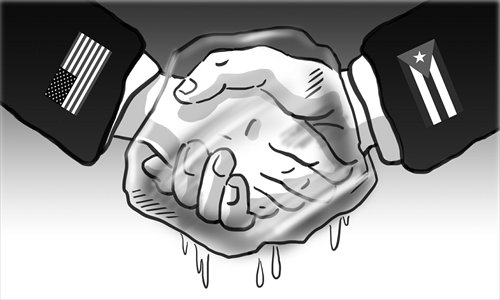Cold War mentality may linger despite US-Cuba thaw

Illustration: Liu Rui/GT
US President Barack Obama and his Cuban counterpart Raul Castro, reversing the animosity which lasted over 50 years between both nations, conducted a historic one-hour meeting on the sidelines of the Summit of the Americas in Panama on Saturday, pledging to "turn the page." Although no substantive agreements were made during the discussion, both sides have injected sufficient momentum to defrost the icy ties.
After the Democrats were given a double slap in Congressional elections in 2014, Obama knows his advantages will not rest at home any more. A preliminary nuclear deal with Iran and an overhaul of the rigid Cuba policy are robust credits to his terms in office.
Obama's diplomatic moves are in line with the relative decline of US influence in the international community. Since Obama took office, his rebalance to Asia has become a pillar of his diplomacy. However, his administration's efforts to contain China's rise have not paid off properly. Meanwhile, restiveness is growing stronger in Washington's backyard, with the Latin American left coming up to challenge US dominance.
Declaring that the long-term sanctions against Cuba are wrong, Obama has implicitly admitted that Washington is losing the strength to wield its economic baton as fiercely as it wants. Washington has to scale back its deployment of resources and save it for something strategically essential to its national interests.
As for Cuba, a lift in the embargo will be a huge relief to the nation's crippled economy, but the thaw might not just bring economic vitality. As The New York Times said in its editorial, "going forward, American support for Cuba's civil society and dissidents is likely to become more effective." It is possible that, with wide-open arms, Washington is hiding peaceful revolution and color revolution behind its approaches.
Washington's "rebalance" to Latin America, as many Western media put it, aims at China, whose influence is growing on this continent. A Huffington Post article even compared the Gulf of Mexico to the South China Sea, assuming that China may ask for "the right to start sailing its vessels in the Gulf of Mexico in response to the US sailing intelligence vessels in the South China Sea."
If that is also what the US administration thinks, it only demonstrates the US is still living in the Cold War. But China is not the Soviet Union, and the time when it made diplomatic decisions out of ideological concerns is long gone. China is pursuing Latin America's massive market and abundant resources, forging business-driven ties with all possible partners, be they socialist or capitalist, in this region for reciprocity. If business engagement, without political and ideological strings, is also an "intrusion," then we have to say the US is making a fuss once again.